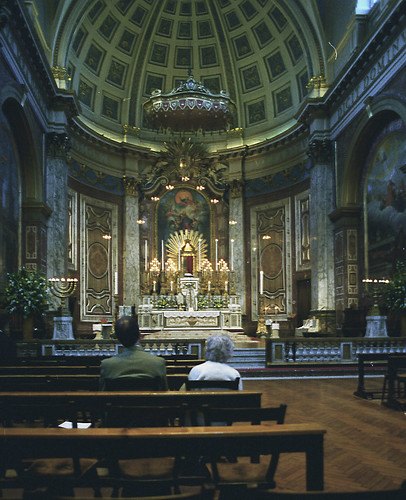
Christians in Western Europe and the US sometimes become members of an Orthodox church - that is, a church not under the jurisdiction of the Pope, the Bishop of Rome. Often, they have previously been Catholics or members of a Protestant church. It is not a decision they will have made lightly and there are many reasons for their choice. They may not like the modern liturgy of the Catholic church, and might feel that the more conservative and antique Orthodox liturgy is more authentic; they may find some of the rules too harsh; they may disapprove of the amount of power that the Pope has; or their motivation may be a combination of all of the above.
Having decided to do this, the first question that arises is which Orthodox church to join. The Russian? Not if one has no connection whatsoever with Russia. The Greek? On the face of things, Greece is less specifically national, but in practice it is a church mostly for immigrants from Greek-speaking countries, in Britain, from Cyprus. So it is an ethnic minority church. All that are left after that are are the national churches of the smaller Balkan countries, plus Finland and Estonia.
A friend of mine opted for the Orthodox church, and faced with the need to make a decision, somehow ended up in the Euphorbian Orthodox Church, the national church of Euphorbia, a small country that was formerly behind the Iron Curtain. Their church is a converted Baptist chapel off the Portobello Road - very nicely done with some good ikons. It which takes him the best part of an hour to get to from where he lives in Stoke Newington. Services are in Euphorbian, an obscure language unrelated to any other in the world. I am not quite sure why he picked on the Euphorbian church rather than the Greek or the Russian one, but I get the impression that he found the congregations at the others were a bit stand-offish, whereas the Euphorbians were open and friendly.
The Orthodox churches are not Protestant, share the same creed with the Catholics and their priests have valid Apostolic orders. I have attended Orthodox services in Eastern Europe and have always been impressed by the beauty and prayerful quality of the liturgy. In contrast, Catholic services these days tend to be on the rough-and-ready side. But almost wherever one goes, the churches are pretty much filled with the usual mixture of people of local origin, immigrants and vistors from abroad. The liturgy is just about acceptable, though it would be better if protestant hymns were weeded-out and the priests were properly disciplined to "Say the black - do the red". My preference is for the kind of liturgy one finds at the London Oratory - which others might regard as a bit of conceit these days.

There is much to be admired in Orthodoxy. The liturgy has not been tampered with, unlike that of the Catholic church, in recent years to its great detriment. It has a particular spirituality uninfluenced by Protestantism.
But the Orthodox Churches are national churches and have inevitably fallen under the control of emperors, kings, presidents, and dictators. A further difficulty arises in those countries which are outside the geographical areas that come under the Orthodox jurisdictions of Constantinople, Moscow, etc., which means that there are problems in countries that fall within the geographical jurisdiction of Rome. In those countries, the Orthodox churches will always be expatriate churches composed of immigrants - or else, what might be termed minority interest groups; the situation in the USA is chaotic, with long-established Russian Orthodox communities in Alaska, founded when the state was part of Russia, plus others formed of different immigrant groups. Membership of such congregations means being cut off from both the wider and the local Christian community, with all the consequences that follow from that separation. Instead of travelling half way across London every Sunday, my friend could attend his local Catholic church five minutes' walk from where he lives and become a part of that community.
The ultimate problem, however, is that the Petrine ministry was established by Jesus Christ himself (Matthew 16:18) for good reasons - to provide a person to whom all Christians can look as the source of authority, thereby ensuring that the true doctrine is maintained, unchanged and undiluted, whilst at the same time acting as a source for the interpretation of doctrine in the context of a changing world. Without the Petrine office, the church must in the end become a living fossil.
Postscript - April 2017
Pope Benedict resigned two years after I wrote this piece. We are four years into his successor's papacy. The "reform of the reform" which was gathering pace in 2011, four years after Summorum Pontificum, was arrested and further progress has been stalled. The picture looks less clear than it did then.
Kommentarer
But, as far as I have read, St. Peter did not rule with monarchial authority over the other Apostles. It was St. James who presided over the Council of Jerusalem (Acts 15).
And St. Peter went on Apostolic missions like his brothers in faith. He was bishop of Antioch before Rome.
I hope Catholics and Orthodox find unity and soon. But the Roman version is not entirely accurate. God bless.